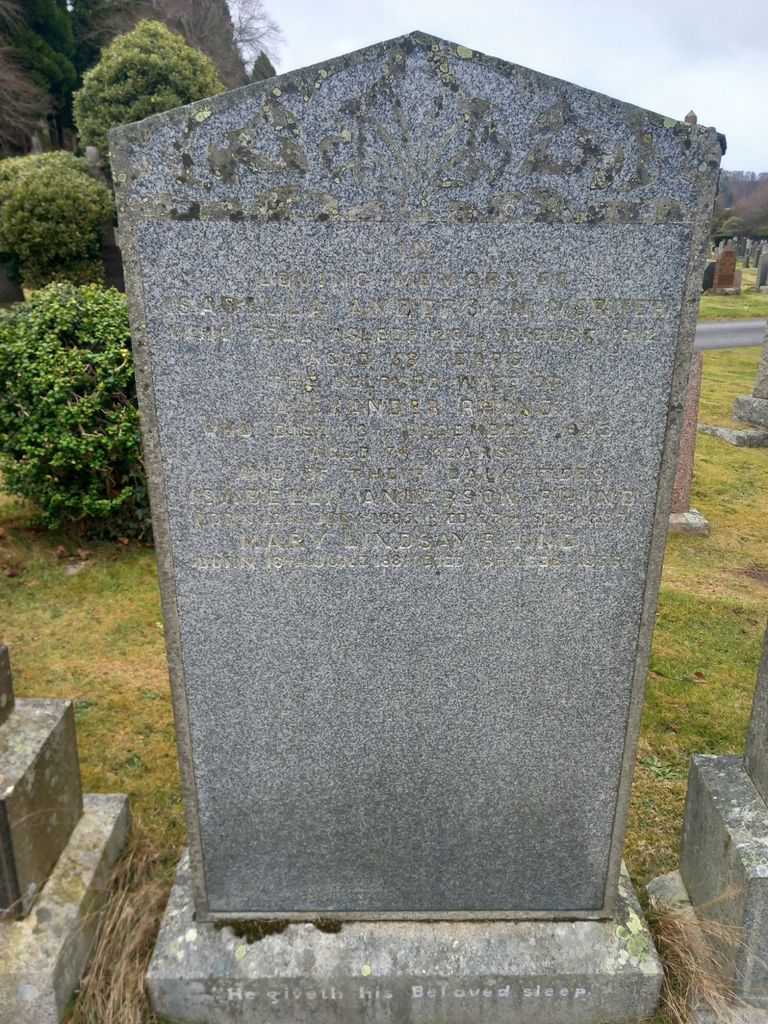Alexander Rhind
Of all the players to have represented Scotland in the first international in 1872 Alex Rhind is the only one, so far, of whom we have no definitive picture or drawing. In part that is because his time at the club was relatively brief, in addition to which he was a player, a central forward, who seems for the game to have been promoted, like fellow central forward, Billy Mackinnon, from the Second XI and probably returned there. Otherwise he is known in 1873 to have been refereeing. Nor would he feature in Queen's Park 1874 Cup-winning team or later. But then that was because in November 1873 he had left Glasgow, where, like several club members, he had worked as a draper, and returned to his roots.
Alex Rhind had been born in Aberdeen in 1849, the son of an Aberdonian mother and an assistant draper-father from Aberdeenshire. In 1861 the family was living in Bancory Devenick, on the edge of the city but by 1871 Rhind Jnr. was lodging with his younger brother and in Glasgow, indeed in Tradeston.
Yet by 1881 not only was Alex Rhind back in Aberdeen, working as a drapery salesman, he was now married, and to a Glasgow girl. However, whilst the couple, now with six children, three girls and three boys, would still be in Old Machar in the Granite City in 1891 they would not stay put. In1892/3 they moved permanently to Inverness, where he opened a drapery shop and where not necessarily his but family involvement with football continued, in fact was integral to the story of the development of the game in the Highland capital.
Inverness had three major football teams. On The Crown above the city centre was Thistle, across the River Ness in Merkinch was and is Clachnacuddin and a little further out was Caledonian, with its Telford St . ground beside the canal of the same name. It was Thistle and Caledonian, which of course combined to form today's Caley-Thistle and move to the present stadium. But that would not be until 1994, since when the latter's ground is now a housing estate and the former's a retail park. And the Rhind family would live in various, substantial houses west of the river, all of which were close to the Caledonian ground. It is even suggested that Alex was President of the club but there is no evidence of this or any direct involvement in Invernesian football by the ex-international.
But the same is not true of at least two of his sons, Robert, born in 1887, and James, five years younger, of whom there is a photograph in footballing action. In 1913 the Inverness Courier reporting on a Scottish Qualifying Cup tie between Caledonian and Kirkcaldy United noted that:
"The Rhinds were the pick of the lot. Their every movement was cool and calculated."

Moreover, Robert to emulate his father in moving to Glasgow, where he is said to have turned out for Third Lanark, joined Queen's Park and from 1913 played sixteen times for its first team, showing, it was said, many of his father's still remembered traits. And Jimmy, if anything, went further. Again in 1913 in a friendly game between an Inverness XI and visiting Tottenham Hotspur, managed by Peter McWilliam, born in Inverness, a former player for Thistle, Newcastle and Scotland, a game won by the Highlanders, he, aged twenty-one, was spotted by the man himself and invited for a trial at White Hart Lane. And he is also said to have been made an offer from his father's home-town, from Pittodrie, but with no indication that it was taken up.
And Alex Rhind would have been aware of his sons' football prowess. No doubt he was Robert's link to Queen's Park, one that had by then lasted forty-years and would seemingly continue until his death. Robert would, by then aged thirty-two, play his last game for the Hampden club in 1920. It would be just three years before in December 1923 his father at the age of seventy-four passed away. Then, still in Inverness, he was staying on Lochalsh Road, which runs parallel to Telford and he is buried in the city's Tomnahurish Cemetery, a little over a mile to the south.
Birth Locator:
Residence Locator(s):
1861 - 40, Thistle St., Aberdeen
1871 - 92, South Portland St, Glasgow
1881 & 1891 - Richmond Terrace, Old Machar, Aberdeen
1901 - Rangemore Road, Inverness
1923 - Lochalsh Road, Inverness
Grave Locator:
Tomnahurich Cemetery, Inverness
Other Sources:
And there is always Andy Mitchell's inestimable:
Back to the Highland and Moray Trail
the Queen's Park & Southside Trail
or the SFHGHome page